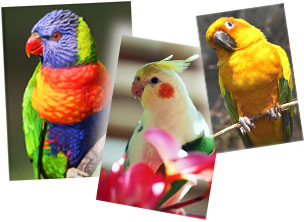
Comparing and Selecting the Right Parrot
With a wide variety of parrot species suitable as companion pets and each having its own charm and concerns, it is no wonder that owners are hard put in deciding what type of parrot to choose as pets.
Factors To Consider Before Choosing Your Pet Parrot
There are a number of factors to consider whether one parrot species would be suitable to an individual. These are the cost, the level of commitment required, the acceptable noise level in the household, the space available, allowance for mess and destruction, the availability of required food, the level of socialization and the expectations of the owner with regards to the capabilities or characteristics of the pet.
Imbalanced or incomplete diet is a common problem with pet birds and is a common cause of illness and behavior difficulty. There is an existing lack of scientific study on avian nutrition since it relates to different species. This would then put some responsibility on the part of the owner to actively discover the real preferences of his/her pet that would allow it to maximize its physical and behavioral development. The owner should equip himself/herself with the information at hand to serve as guide on whether he/she is able to answer the particular needs of a parrot species.
The long lifespan of parrots should make prospective owners all the more careful and truthful in choosing. The length of happiness or misery for both the parrots and the owners is quite considerable just to have a decision based on a whim. Choosing should not be based either with how well the bird fits the color interior of the house or whether an individual has lots of money to spend. It is about consciously choosing a bird that would require love, time, care and attention. It is about getting a bird and placing it in a home which is unfamiliar to it. It is about the corresponding responsibility that falls on the shoulder of the owners and members of their families. Ultimately, it is about the quality of life that will result from the pet-owner relationship.
Comparing parrot species can be relatively easy when one knows where to start. Since it is impossible to ask intelligent and valid questions with zero information, prospective parrot owners would do well to read and seek correct information. Existing bird owners, breeders, shop owners are good sources of information based on actual experiences and knowledge.
Before making a choice, prospective owners should consider their motives and individual requirements in owning a parrot. “Selfish motives” such as simply wanting to have a pet bird are but natural but should be thought over and over again to determine its long term effects. The need to have a pet bird may be answered by acquiring other bird types that are not so much associated with behavior problems when raised the wrong way. The demands of parrots to their owners can be quite different from those of other birds.
If one is seriously into parrots and have the intention of breeding them, smaller species are ideal starters. Generally, the bigger the bird, the higher the level of maintenance required from its owner. To thoroughly enjoy the company of one’s chosen parrot, one should have also considered the effect of having the parrot to neighbors and the surrounding area. A person may find the noise of parrots tolerable but may not necessarily be so for other people who are within hearing distance.
Choosing a specific breed or species is a matter of personal opinion and assessment. No one knows what a person can do or not do except the person himself/herself. As a word of caution, parrots are like children. One wouldn’t really know what to expect until one actually lives with it.